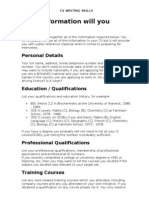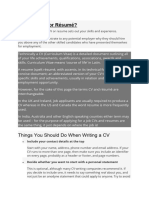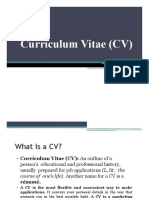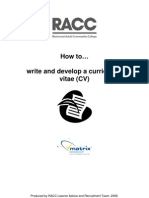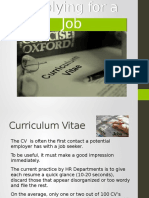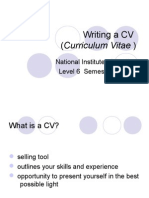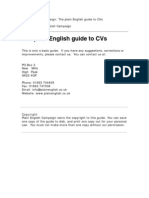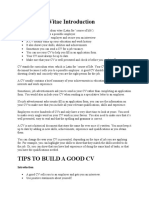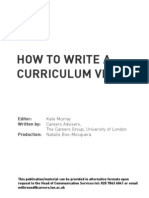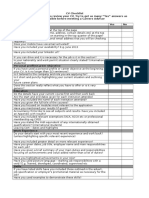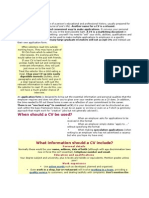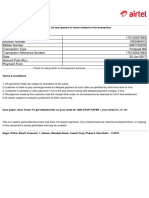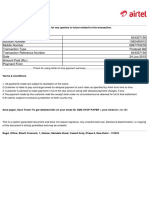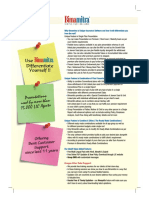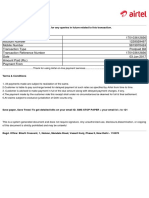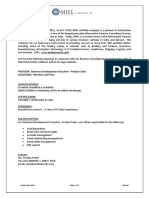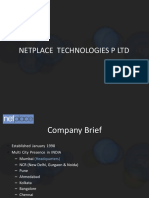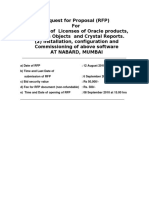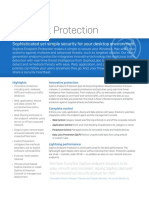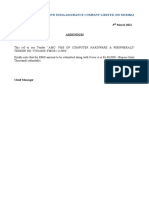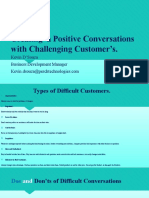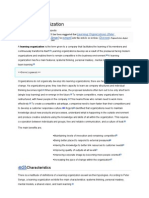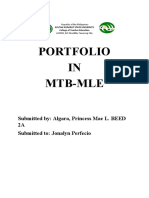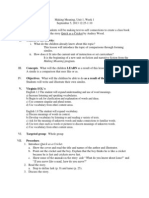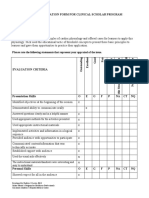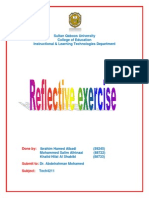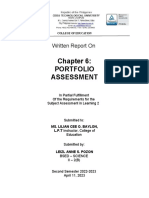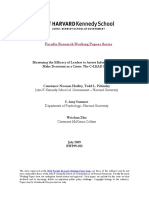How to Write a Great First CV
(Resume)
Norman Creaney
�Interchangable Terminology
Curriculum Vitae
Rsum
"a brief biographical
rsum of one's career and
training, as prepared by a
person applying for a
job."
- Dictionary.com
"a brief written account of
personal, educational, and
professional qualifications and
experience, as that prepared by
an applicant for a job."
- Dictionary.com
More common term in the
UK
More common term in the USA
�Why do I Need a CV?
Many employers will ask
for one
Think of your CV as a
brochure designed to
promote you
Take some time and effort
and create a really great
CV - it will be worth the
effort
In an application form you
are limited in what you
can say about yourself you can only answer the
questions that are asked
In your CV, you are in
control. Take advantage
of this and show yourself
in the best possible light
�Your CV is a Work-In-Progress
Keep a master CV, which is
updated cumulatively as you
progress in your career:
Each time you apply for a
job, make a copy of your
master CV:
add to it only when you have
new experience or
achievements to record
edit the copy to reflect
the specific requirements
of the job you are
applying for
delete from it only as older
items appear less significant
in the light of new
experience
keep careful records of
what was submitted for
which vacancies
�What Should I Put in my CV?
The past
how have you spent your life so far?
what have you achieved?
The present
what are you currently doing?
what have you learnt from what you have done in the past?
The Future
where do you want to end up?
how do you plan to get there?
�The Past
How have you spent your life so far?
schools and colleges attended (with dates)
qualifications attained (with dates and grades)
employers and job titles (with dates)
student/vacation work (with dates)
What have you achieved?
Do you have any sporting achievements?
Do you play a musical instrument? Do you play in a band or orchestra?
Are/were you a member of any student clubs societies?
Have you undertaken any voluntary work?
Have you ever won any prizes or awards?
Have you taken a leadership role or position of responsibility with respect
to any of the above?
�The Present
Subject or industry specific skills:
For an IT professional you might list the programming languages that you
have used - indicating your level of experience in each.
If you are a school teacher you might list the subjects and levels at which
you have taught.
Generic or transferable skills:
Can you write well?
Can you communicate effectively on the telephone?
Can you fit in to their team?
Are you reliable
Can you be trusted with money?
Do you have any leadership ability?
�Which Candidate Impresses you more?
Candidate 1:
Candidate 2:
"I gained considerable experience in
dealing with the public during my
summer job as receptionist for the
Ramada Hotel, Portrush. This
involved responding to enquiries on
the telephone and registering guests
on arrival. I feel much more confident
in dealing with the public now."
"I am good at
dealing with the
public."
�Can You Describe a Situation When
You Have Demonstrated any of the
Following Qualities?
Hard working
Good attitude
Pleasant personality
Punctual
Reliable
Leadership Qualities
Initiative
Common Sense
Honest
Flexible
Focused
Ambitious
Self motivated
Organised
Responsible
Enthusiastic
Resourceful
�The Future
It is good to have a career goal. It indicates that you are
ambitious and are taking your career seriously.
Your goal should be ambitious but achievable.
You should be knowledgeable about what your goal
entails, and be prepared to discuss it at interview.
You should have a realistic plan for achieving your goal
The job for which you are applying should be part of that
plan.
�Which Candidate Impresses you More?
Candidate 1:
Candidate 2:
"I want to spend four years
working in web design and
development to get
experience of the
technologies and the
business. After that I intend
to become an internet
entrepreneur."
"I'm not really sure what I
want to do. I thought about
web design but then I didn't
know if there would be any
jobs. Maybe I'm more suited
to management."
�How should I Organise my CV?
Use bullet point - or short paragraphs - within each of these
sections.
Personal Details - simple, factual information.
Career Goal - this section is optional but if you decide to include it, be
prepared to discuss it at interview.
Educational History - bullet point your progress (with dates)
Employment History - bullet point your progress (with dates)
Skills and achievements - say when & how you have demonstrated these
Referees - make sure you ask their permission first
Leisure Activities - this section should be kept fairly short unless you have
something very interesting to say.
Within each section, put more recent items above older ones
�The Person Reading your CV is Busy
... so use structure, layout and formatting to help him.
Keep the structure, formatting and layout simple, logical and
consistent.
Use layout such as white space, indentation and bullet lists:
to emphasise important information such as dates
to enable the reader to scan quickly to the information he is
interested in.
Keep the text of each item brief but self contained.
Your CV should normally be no longer than two sides.
Do not use a font that is smaller than 11 point Times New Roman
(or equivalent) - 12 point is even better.
�Write, Read, Revise ... Repeat ...
Writing is an iterative process that may include multiple
cycles of proof-reading and revision.
It is very difficult to proof-read your own writing so it is best
to get the help of a friend.
If you cannot get a friend to help then it may help to:
Read your writing aloud to yourself - this often uncovers
problems that would otherwise go unnoticed.
Do not try to do everything at the one session - leave
some time between writing and proof-reading.
�Ac-cen-tuate the Positive
In all communication with a
potential employer:
1. Clearly indicate your
positive attributes
emphasising those that are
most relevant to the
vacancy.
2. Say nothing about your
negative attributes unless
youre specifically asked.
3. Be truthful do not tell any
lies.
Mister In-Between
~ Johnny Mercer & Harold Arlen
"You've got to accentuate the positive.
Eliminate the negative.
Latch on to the affirmative.
Don't mess with Mister In-Between."
�Related Materials
How to Write a Great First CV (Resume)
http://knol.google.com/k/-/-/1hzaxtdr9c09g/12#
How to Write a Great Cover Letter
http://knol.google.com/k/-/-/1hzaxtdr9c09g/24#

